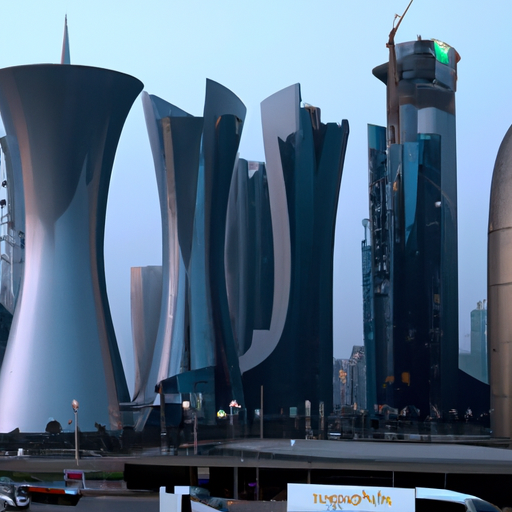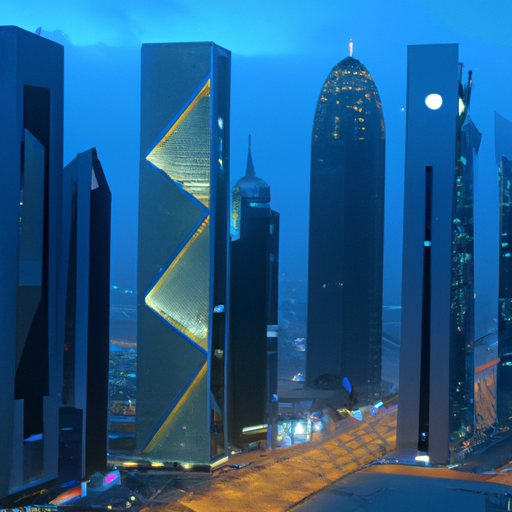
Impact of USD1.9 Trillion Worth of Hotel and Residential Projects in the Middle East
The Middle East has long been a hub of economic activity, with its strategic location and rich natural resources attracting investors from around the world. In recent years, the region has witnessed a surge in hotel and residential projects, with a staggering USD1.9 trillion worth of developments currently under development. This influx of investment is set to have a significant impact on the region’s economy, as well as the lives of its residents.
One of the most immediate effects of these projects is the creation of jobs. With construction and development activities in full swing, there is a high demand for skilled and unskilled labor. This presents a golden opportunity for the local workforce, who can benefit from the employment opportunities that these projects bring. Not only does this boost the region’s economy, but it also helps to alleviate unemployment rates and improve the standard of living for many individuals and families.
Furthermore, the hotel and residential projects will have a positive impact on the tourism industry in the Middle East. The region is already a popular destination for tourists, thanks to its rich history, vibrant culture, and stunning landscapes. However, the addition of new hotels and residential properties will further enhance the region’s appeal to both domestic and international travelers. This, in turn, will lead to an increase in tourist spending, benefiting local businesses and contributing to the overall economic growth of the region.
In addition to the economic benefits, these projects will also have a lasting impact on the infrastructure of the Middle East. As new hotels and residential properties are built, there will be a need for improved transportation networks, including roads, airports, and public transportation systems. This will not only make it easier for residents and tourists to navigate the region but will also enhance connectivity between different cities and countries in the Middle East. The improved infrastructure will not only benefit the hotel and residential sectors but will also have a positive ripple effect on other industries such as trade and commerce.
Moreover, the development of hotels and residential projects will contribute to the overall urbanization of the Middle East. As more people move to the region in search of employment and better opportunities, there will be a need for additional housing and accommodation options. This will lead to the construction of new residential properties, ranging from affordable housing to luxury apartments and villas. The urbanization of the region will not only cater to the growing population but will also create vibrant communities and neighborhoods, offering a wide range of amenities and services to residents.
In conclusion, the USD1.9 trillion worth of hotel and residential projects currently under development in the Middle East will have a significant impact on the region’s economy and its residents. The creation of jobs, boost to the tourism industry, improvement of infrastructure, and overall urbanization are just a few of the positive outcomes that can be expected. As the projects continue to take shape, the Middle East is poised to become an even more attractive destination for investors, tourists, and individuals seeking a better quality of life.
Future Prospects and Opportunities in the Middle East’s Hotel and Residential Development Sector

The Middle East has long been a hub for luxury hotels and residential developments, and it shows no signs of slowing down. With a staggering USD1.9 trillion worth of projects currently under development, the region is poised for even more growth and opportunities in the hotel and residential development sector.
One of the key factors driving this surge in development is the region’s booming tourism industry. Countries like the United Arab Emirates, Saudi Arabia, and Qatar have been investing heavily in promoting themselves as tourist destinations, attracting visitors from all over the world. As a result, there is a growing demand for high-quality accommodation options, both for short-term stays and long-term residences.
In addition to the tourism industry, the Middle East is also experiencing a population boom. With a young and growing population, there is a need for more housing options to accommodate the increasing number of people. This has led to a rise in residential development projects, catering to both local residents and expatriates looking to settle in the region.
The hotel and residential development sector in the Middle East offers a wide range of opportunities for investors and developers. From luxury resorts and high-end residential towers to affordable housing projects, there is something for everyone in this thriving market. The region’s governments have also been proactive in creating favorable investment climates, offering incentives and tax breaks to attract foreign investors.
One of the most exciting prospects in the Middle East’s hotel and residential development sector is the focus on sustainability and innovation. With a growing awareness of the need to protect the environment and reduce carbon footprints, developers are incorporating green building practices and technologies into their projects. From solar panels and energy-efficient systems to water conservation measures, these developments are setting new standards for sustainable living.
Another area of opportunity lies in the integration of technology into hotel and residential developments. The Middle East is known for its embrace of cutting-edge technologies, and this is reflected in the design and functionality of its buildings. Smart homes, automated systems, and digital concierge services are just some of the innovations being incorporated into these projects, enhancing the overall experience for residents and guests.
Furthermore, the Middle East’s hotel and residential development sector is not limited to traditional urban centers. There is a growing trend of developing projects in secondary cities and emerging markets, offering investors a wider range of options. This decentralization of development is not only beneficial for these cities but also helps to alleviate the strain on major urban centers.
In conclusion, the Middle East’s hotel and residential development sector is experiencing a period of unprecedented growth and opportunities. With a booming tourism industry, a growing population, and a focus on sustainability and innovation, there is a wide range of projects to suit every investor’s needs. Whether it’s luxury resorts, affordable housing, or cutting-edge smart homes, the region offers something for everyone. With a favorable investment climate and a commitment to excellence, the Middle East is poised to become a global leader in the hotel and residential development sector.
Challenges and Risks Associated with the USD1.9 Trillion Worth of Projects in the Middle East
The Middle East has long been a hub for ambitious construction projects, and the current landscape is no different. With a staggering USD1.9 trillion worth of hotel and residential projects under development, the region is poised for significant growth and transformation. However, with such massive investments come a set of challenges and risks that need to be carefully navigated.
One of the primary challenges associated with these projects is the sheer scale of the undertaking. The Middle East is known for its grandiose architecture and luxurious developments, and this trend is evident in the current wave of projects. From towering skyscrapers to sprawling resorts, the size and complexity of these ventures can be overwhelming. Managing such massive projects requires meticulous planning, coordination, and execution.
Another challenge is the volatile geopolitical landscape of the region. The Middle East has long been plagued by political instability and conflicts, which can have a significant impact on the progress and success of these projects. Investors and developers must carefully assess the risks associated with operating in such an environment and take appropriate measures to mitigate them. This may involve partnering with local stakeholders who have a deep understanding of the region’s dynamics or implementing robust security measures to protect assets and personnel.
Furthermore, the Middle East is no stranger to economic fluctuations. The region’s economy is heavily reliant on oil revenues, which are subject to global market forces. Fluctuations in oil prices can have a direct impact on the funding and viability of these projects. Developers must be prepared to adapt to changing economic conditions and have contingency plans in place to ensure the continuity of their projects.
In addition to these challenges, there are also risks associated with the cultural and regulatory landscape of the Middle East. Each country in the region has its own unique set of laws, customs, and business practices. Navigating these intricacies can be a daunting task for international investors and developers. It is crucial to have a deep understanding of the local culture and legal framework to ensure compliance and avoid any potential pitfalls.
Moreover, the Middle East is known for its extreme climate, with scorching summers and harsh desert conditions. These environmental factors can pose significant challenges during the construction and operation of projects. Developers must invest in innovative design and engineering solutions to mitigate the impact of the climate and ensure the comfort and safety of residents and guests.
Despite these challenges and risks, the Middle East continues to attract investors and developers from around the world. The region’s strategic location, booming tourism industry, and growing population make it an attractive destination for real estate and hospitality projects. With careful planning, risk assessment, and execution, these projects have the potential to deliver substantial returns on investment.
In conclusion, the USD1.9 trillion worth of hotel and residential projects under development in the Middle East present both opportunities and challenges. The scale and complexity of these ventures, coupled with the volatile geopolitical landscape, economic fluctuations, cultural and regulatory nuances, and extreme climate, require careful navigation. However, with the right approach and a deep understanding of the region, these projects have the potential to transform the Middle East’s real estate and hospitality sectors and contribute to its continued growth and development.


